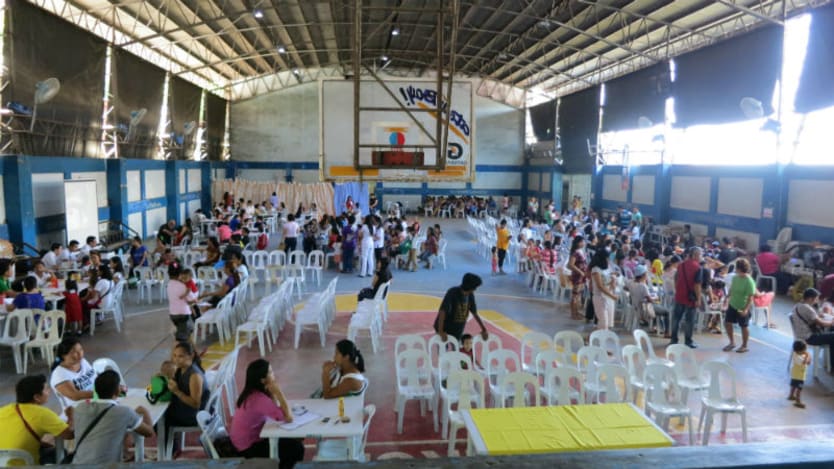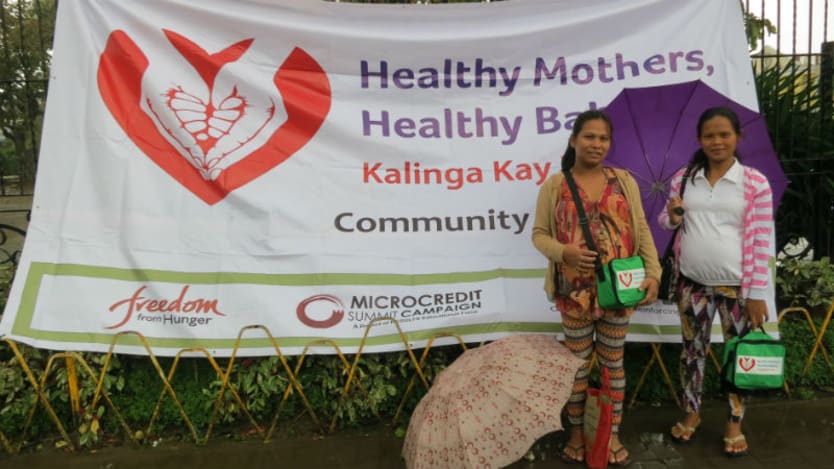
How do you encourage women most in need — and often hardest to reach — to access appropriate pre and postnatal care? And how can you reach large numbers of women, both efficiently and cost-effectively?
Consider the story of Maria.* We met her as part of the Healthy Mothers, Healthy Babies initiative, which is supported by an educational grant from Johnson & Johnson and brings together CARD and international nongovernmental organizations Freedom from Hunger and RESULTS Educational Fund, in an effort to scale affordable maternal health solutions in the Philippines.
Maria’s story
Maria arrives at the indoor/outdoor community gymnasium in the early morning darkness to hushed voices and shuffling feet. Already there is a line of pregnant women, just like her, patiently awaiting pre-natal services not to be offered for another couple of hours. Maria scans the crowd for other people she knows, including her account officer from CARD the event organizer, in collaboration with a mix of public and private health providers. As the sun rises and the day heats up, the hum of pregnant women, health staff, mothers and babies reaches a crescendo. A community health worker guides Maria through a series of diagnostic tests such as blood pressure screening, weight measurement and urinalysis. Although a little nervous about the interaction, she is delighted to receive face time with an obstetrician-gynecologist — her first time, despite this being her fourth pregnancy. Because she is nearly 40 years old, it is recommended that Maria receive an ultrasound. Seeing her baby on the monitor, she feels incredulous, yet relieved. The baby is healthy and has a strong heartbeat. Ultrasound image in hand, she cannot wait to share the news with her local rural health unit nurse — currently assisting with diagnostic tests in the far corner of the gymnasium — and with her family at home.
Financial services institutions such as CARD are often trusted actors that live and work in the community. Why not use the scale and structure of a microfinance institution to reach more women like Maria — and their families — with health interventions? You have heard the adage, “It takes a village to raise a child.” Well, the same must be said for health, as it takes an entire community to keep a child, mother, or anyone else in the family in good health.
How can we collaborate, taking advantage of each partner’s — be it a health provider, financial services practitioner, international development specialist or other community actor — core strengths to achieve common goals and avoid reinventing the wheel?
Resources exist, including guides written for microfinance institutions or other field staff, with tangible steps to designing community partnerships.
In CARD’s case, we learned that understanding needs and, resources, and then mapping solutions helped improve access to preventive health services, as described in the Healthy Mothers, Healthy Babies final program evaluation. Creativity and maintaining an open mind in regards to diverse actors and unique partnerships is essential for improving community health.
The HMHB strategy utilized CARD’s vast platform of micro-loan groups in which millions of women like Maria attend weekly meetings to deliver maternal health education via trained CARD staff. The women learn about maternal nutrition, the importance of delivering in a facility, making a birth plan, and pregnancy danger signs.
Microfinance institutions are active community players in many countries, reaching more than 100 million people worldwide, most of whom are women. This unlikely health advocate has the potential to link its platform with health actors to improve access to services for millions. Health institutions are starting to take notice.
PhilHealth, the country’s national health insurance program, has found it difficult to reach some of the people most in need, because they often works in informal sectors, selling food at a market, or perhaps simple goods and or hygiene products from home.

At HMHB Community Health Fairs — which have provided access to pre- and postnatal health services for nearly 9,000 of those women — pregnant women can enroll on the spot for health serviceshealth insurance, and encourage encouraging delivery in a facility.
Although the project was recently completed, the HMHB initiative has been adopted and integrated into CARD’s existing Healthy Pinoy program. This means that the institution is continuing to build upon the more than 800,000 women who received maternal health education and 9,000 pregnant and lactating women who enjoyed maternal health fairs. It means that the new “MFIs for Health” consortium will continue to expand and explore collaboration and advocacy efforts with each other, in addition to approaching health providers and local governments with offers of partnership.
*Name has been changed to protect her privacy
Join the Devex community and access more in-depth analysis, breaking news and business advice — and a host of other services — on international development, humanitarian aid and global health.
Search for articles
Most Read
- 1
- 2
- 3
- 4
- 5


